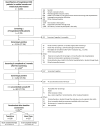Efficacy of Team-Based Collaborative Care for Distressed Patients in Secondary Prevention of Chronic Coronary Heart Disease: Results from the Multicenter, Randomized Controlled TEACH Trial
- PMID: 40414218
- PMCID: PMC12215170
- DOI: 10.1159/000545865
Efficacy of Team-Based Collaborative Care for Distressed Patients in Secondary Prevention of Chronic Coronary Heart Disease: Results from the Multicenter, Randomized Controlled TEACH Trial
Abstract
<p>Introduction: Coronary heart disease (CHD) has serious implications for patients' quality of life (QoL). Psychological distress affects 15-40% of patients with CHD and is robustly associated with poorer prognosis. Blended collaborative care (BCC), a telephone-delivered intervention involving non-physician care managers that addresses both psychological and medical factors, can be applied for secondary prevention of CHD.
Methods: We conducted the multicenter, randomized controlled TEACH trial that investigated the efficacy of a BCC intervention (TeamCare) in distressed CHD patients. The primary aim was to examine the treatment response rate of TeamCare, defined as ≥50% improvements in health-related QoL (HRQoL, assessed by HeartQoL) after 12 months compared to usual care (UC). Secondary endpoints were changes in HRQoL, psychological and medical factors, and satisfaction with care.
Results: In total, 457 patients (mean age 62.9 ± 9.5 years, 23% females) were randomized to TeamCare (n = 230) or UC (n = 227). At 12 months, TeamCare patients showed a significantly higher proportion of treatment response to HeartQoL compared to UC (19% vs. 10%, respectively). TeamCare yielded significantly greater improvements in HeartQoL scores: global (d = 0.338), physical (d = 0.270), and emotional (d = 0.382). Further, TeamCare led to a significantly greater decrease in depression (d = -0.329), anxiety (d = -0.300), perceived stress (d = -0.233), and medical risk score (d = -0.235). Finally, BCC patients showed a higher satisfaction with overall treatment and psychosocial care.
Conclusion: The TEACH study is the first ever performed BCC trial in distressed CHD patients in Europe. The BCC intervention has the potential to significantly improve secondary prevention in distressed CHD patients. </p>.
Keywords: Blended collaborative care; Cardiovascular risk factors; Coronary heart disease; Psychological distress; Randomized controlled trial; Secondary prevention.
© 2025 The Author(s). Published by S. Karger AG, Basel.
Conflict of interest statement
R.W. reports receiving personal fees from AstraZeneca, Bayer, Bristol Myers Squibb, Boehringer Ingelheim, CVRx, Daiichi Sankyo, Medtronic, Novartis, Pfizer, Pharmacosmos, and Servier and research support from Boehringer Ingelheim, German Ministry of Education and Research, the German Research Foundation, the European Union and Medtronic, outside the submitted work. C.A. received lecture honoraria from Bayer Vital and research funding from the German Ministry of Education and Research and the Commission of the European Union. C.H.-L. reports that he is receiving royalties from Hogrefe Huber Publishers for the German version of the HADS. During the last 3 years, he has received a lecture honorarium from Pfizer and research support from the German Ministry of Education and Research, the German Research Foundation and the European Commission, all unrelated to this research. Others declared no potential conflicts of interest with respect to the research, authorship, and/or publication of this article.
Figures




References
-
- Virani SS, Newby LK, Arnold SV, Bittner V, Brewer LC, Demeter SH, et al. 2023 AHA/ACC/ACCP/ASPC/NLA/PCNA guideline for the management of patients with chronic coronary disease: a report of the American heart association/American College of Cardiology joint committee on clinical practice guidelines. Circulation. 2023;148(9):e9–119. - PubMed
-
- German Federal Statistical Office. Report 2018: hospital health cost, table 23631-0001. Accessed on August 22, 2024.
-
- Tsao CW, Aday AW, Almarzooq ZI, Alonso A, Beaton AZ, Bittencourt MS, et al. Heart disease and stroke statistics-2022 update: a report from the American heart association. Circulation. 2022;145(8):e153–639. - PubMed
Publication types
MeSH terms
LinkOut - more resources
Full Text Sources
Medical

